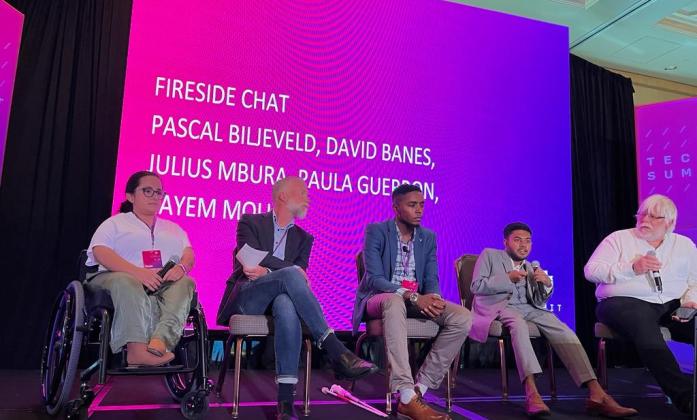International Disability Alliance - Global Disability Innovation Hub (GDI Hub) and AT2030’s Assistive Technology User Fellow, Nayem Molla, attended ATscale convening event on digital assistive technology and employment, and the Remarkable Tech Summit on inclusive innovation in San Diego, California from 2-5 October 2023. The events brought together diverse stakeholders from across sectors and geographies to drive progress and lead discussions to shape the future of assistive technology.

On October 2nd, ATscale hosted a roundtable discussion on "Exploring Disability, Youth and Employment: How AI-Enhanced Digital AT Can Break Barriers in Low and Middle-Income Countries." This timely event aimed to explore assistive technologies' potential to unlock economic opportunities for young people with disabilities in low and middle-income regions. Representatives from organizations like Google, Microsoft, UNICEF, and others shared insights.
As an AT user fellow and a person with disabilities, Nayem underscored the enthusiasm of people with disabilities for digital inclusion in the Global South countries including Bangladesh. "There is huge demand among youth to access digital assistive tech if only services could reach our country affordably," he noted. Other speakers emphasized the importance of innovation and tailored solutions for local communities, rather than a one-size-fits-all approach. They discussed using education and healthcare systems as entry points for assistive technology access, advocating for local manufacturing and distribution to make AT products more accessible. Policy reforms, a shift in attitudes, and capturing disability statistics were urged as essential for progress.
The event highlighted that the development and implementation of assistive technology (AT) must be carried out in close consultation with persons with disabilities or OPDs. Among the various stakeholders contributing to a more inclusive AT landscape, meaningful engagement with AT users is paramount. Their insights, experiences, and feedback are essential to address gaps in availability, affordability, infrastructure, and policies.
The 3-day Remarkable Tech Summit fostered connections among changemakers aligned around disability inclusion and human-centered tech. Discussions spanned from balancing innovation with equitable access to assistive technology to shifting narratives from charity to empowerment. The speakers emphasized comprehensive inclusion by addressing systemic challenges, rather than relying solely on customized tools and isolated accommodations, as Fernando Botelho of UNICEF noted "We need systemic solutions, not magic bullets."
During the summit, Nayem explored the opportunity to outline how AI-enabled tools like screen readers and intelligent writing aids are gaining traction among youth with disabilities in Bangladesh. He also stressed the urgent need for awareness-building on available free and low-cost digital AT subscriptions.
Bernard Chiira of Innovate Now raised a thought-provoking question, asking participants to reflect on their belief in their advocacy. He emphasized that with true belief, progress is inevitable. These words highlight the importance of commitment and belief in driving change, as discussed during the Remarkable Tech Summit.
Across the sessions, key themes also included embedding lived expertise in product design and policymaking, creative approaches like blended financing to fund access, and collaborating across sectors to tackle systemic gaps. A commonly echoed sentiment during the sessions was that "innovation should not be a standalone goal" - instead, we must innovate comprehensive distribution and support systems alongside tools.
